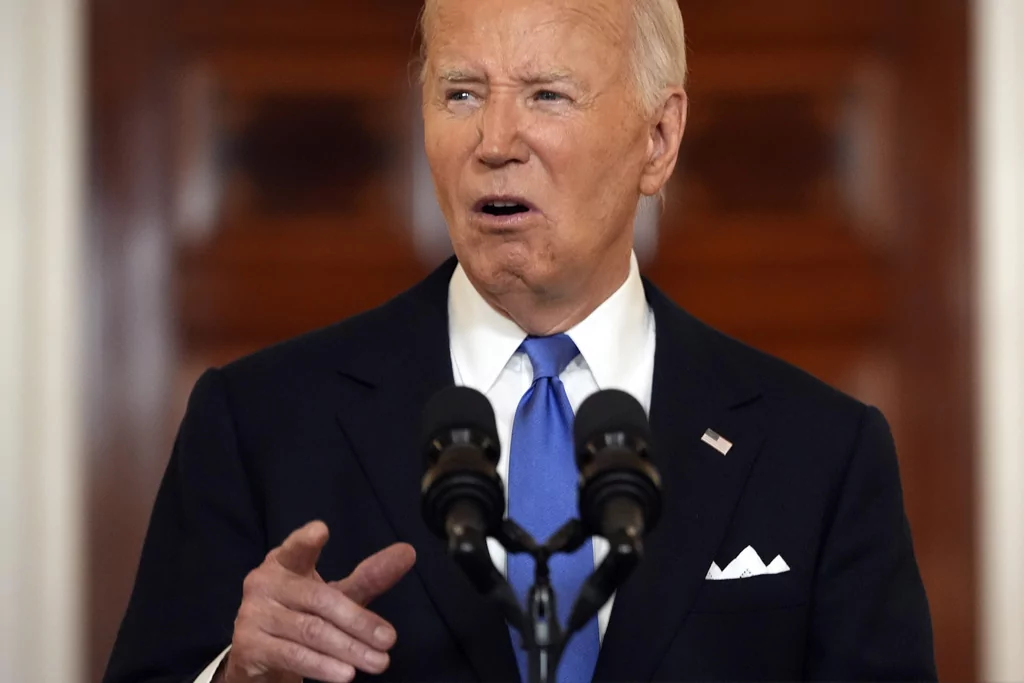
President Joe Biden’s ambitious three-pronged proposal to reform the Supreme Court is not likely to survive past its 15 minutes of fame, legal experts from across the partisan spectrum say.
“It’s all posturing for the election season to try to garner votes amongst the far Left but also to bully the United States Supreme Court into not pursuing its current path of enforcing the Constitution,” California RNC National Committeewoman and lawyer Harmeet K. Dhillon told the Washington Examiner.

On Monday, Biden unveiled a plan to address recent rulings by the conservative-majority Supreme Court that were disfavored by Democrats, namely the July 1 presidential immunity decision in Trump v. United States. His plan proposes term limits for justices, who currently have lifetime appointments, an enforceable ethics code, and a constitutional amendment to overturn the recent ruling that grants former presidents substantial immunity from prosecution for official acts.
Biden’s plans have been reported since at least mid-July, prior to the assassination attempt on former President Donald Trump. Since then, legal experts from both sides of the political aisle have expressed agreement that basic constitutional rules make Biden’s high court plans highly unlikely.
Undoing the Trump immunity decision
So far, the one planned amendment in the three-part plan requested the “No One Is Above the Law Amendment,” which aims to clarify that the Constitution does not shield former presidents from federal indictments, trials, convictions, or sentencing. This move would aim to undo the 6-3 ruling that found former presidents have immunity from being prosecuted for official acts while they were in office.
However, to amend the Constitution, the proposal must be approved by two-thirds of both chambers of Congress and then ratified by three-fourths of state legislatures or state conventions — a process that has succeeded only 27 times in history, with the last amendment ratified in 1992.
Steve Vladeck, a professor at Georgetown University Law Center, questioned in a July 18 Substack blog why Biden was merely highlighting the recent Trump v. United States decision when there are multitudes of other high court decisions Democrats disfavor.
“What about an amendment to overrule Rucho and reaffirm that the federal courts can adjudicate severe partisan gerrymandering? Or an amendment to overrule Citizens United and allow Congress to meaningfully limit the money in our elections? Or an amendment to overrule Dobbs? All of these have the exact same chance of getting two-thirds of the House and Senate to approve them (0.0%),” Vladeck wrote.
Given the slim divide between Democrats and Republicans in Congress and the fragmented state governments, passing such an amendment, especially one favored by a single party, is highly improbable.
18-year term limits for justices
In addition to term limits for justices, Biden referenced the 22nd Amendment, which imposes a two-term limit on presidents following Franklin D. Roosevelt’s four terms. This portion of the plan aims to impose 18-year term limits on the justices.
However, imposing term limits on Supreme Court justices through an amendment faces similar improbabilities. Even if congressional Democrats could pass term limits as a law, it would likely be challenged in court and potentially struck down, as term limits for justices are not specified in the Constitution. Some legal experts believe this too would need to be approved via the required 60-vote constitutional amendment process, while others, such as Vladeck, suggested that the limits might only apply to “future officeholders.”
“So, in my view, statutory term limits would be constitutional only if they went into effect starting with the next justice,” Vladeck said. “That means that, 30-40 years from now, when the last of the current justices leaves the Court, we’d have nine justices with term limits—but not tomorrow.”
An enforceable ethics code
Biden also called for Congress to pass a law establishing an enforceable ethics code for the Supreme Court, requiring disclosure of gifts, abstention from political activities, and recusal from cases with conflicts of interest. Such a law would also need to pass Congress and likely secure 60 votes in the Senate to overcome a filibuster.
Additionally, Vladeck voiced caution over an enforceable ethics code on the nine justices, saying that if anyone other than the justices is given power to enforce a code on the members for violating roles, “we’d no longer have ‘one Supreme Court,’ as Article III, Section 1 says we must; we’d have two.”
Is there any way Biden’s plans could be enacted?
Mike Davis, founder of the conservative Article III Project and a former clerk to Justice Neil Gorsuch, suggested the only way for Democrats to accomplish Biden’s plan is for Vice President and presumptive Democratic nominee Kamala Harris to win against Trump in the November election.
“If Kamala Harris wins the White House, she will almost certainly carry the House and Senate with her,” Davis posted to X.
“They will nuke the Senate’s legislative filibuster — 60 vote threshold — and pack the Supreme Court with radicals,” Davis added.
For now, given that Senate Majority Leader Chuck Schumer (D-NY) has not brought a similar Democratic bill to the floor, meeting the 60-vote threshold in a divided Congress appears unlikely.
The Washington Examiner contacted Schumer for a comment.
CLICK HERE TO READ MORE FROM THE WASHINGTON EXAMINER
Meanwhile, other judiciary advocates, such as Kelly Shackelford, chief counsel for First Liberty Institute, renewed concerns that Biden’s plans merely aim to “subvert the legitimacy of the Supreme Court.”
“Term limits are simply court-packing by another name,” Shackelford said, adding that if Biden’s plans were somehow successful, “the judiciary will no longer be a safeguard of our civil liberties but will instead be little more than a political tool used to crush the freedom of Americans.”
 Mike Davis
Mike Davis 






